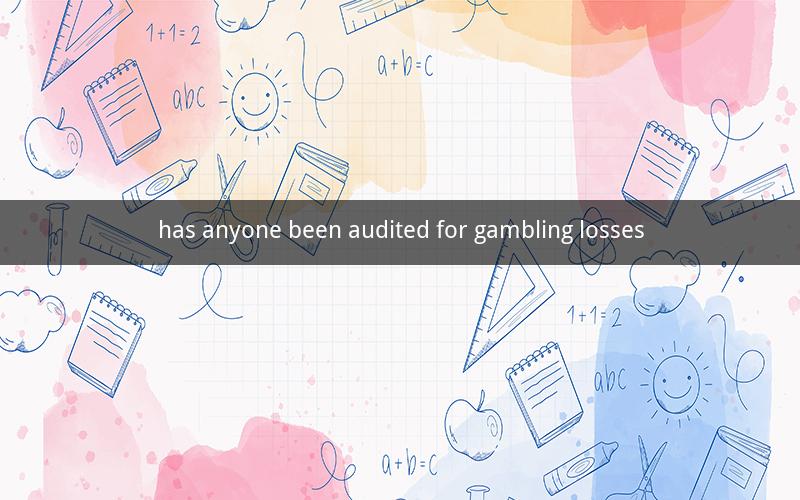
Contents
1. Introduction
2. Understanding the Concept of Gambling Loss Audits
3. Reasons for Being Audited for Gambling Losses
4. The Audit Process
5. Consequences of Being Audited for Gambling Losses
6. Protecting Yourself from Audits
7. Common Questions and Answers
8. Conclusion
Introduction
Gambling has always been a source of entertainment and excitement for many people. However, it is also a subject of concern for tax authorities due to the potential for tax evasion. One common question that arises among gamblers is whether they can be audited for gambling losses. This article delves into the concept of gambling loss audits, the reasons for them, the audit process, and the consequences. It also provides tips on how to protect yourself from audits and answers to some common questions.
Understanding the Concept of Gambling Loss Audits
A gambling loss audit occurs when the Internal Revenue Service (IRS) or state tax authorities suspect that a taxpayer has engaged in gambling activities and may not have reported all their winnings or deducted all their losses appropriately. This can happen to anyone who has reported gambling winnings on their tax return, regardless of the amount.
Reasons for Being Audited for Gambling Losses
Several factors can lead to a gambling loss audit, including:
- Discrepancies in reported winnings and losses
- Inconsistencies in reporting gambling activities over multiple years
- Unusual patterns of gambling expenses
- Lack of documentation to support claimed losses
The Audit Process
If you are selected for a gambling loss audit, the IRS or state tax authority will typically send you a notice of examination. The audit process may involve the following steps:
1. The IRS or state tax authority will request documentation of your gambling activities, such as casino statements, credit card receipts, and bank records.
2. You will be required to provide an explanation of your reported winnings and losses and how you calculated them.
3. The IRS or state tax authority may request additional information or clarification.
4. The auditor will review your records and compare them with the information provided by gambling establishments.
5. If necessary, the auditor may request an interview or examination of your business records.
Consequences of Being Audited for Gambling Losses
The consequences of being audited for gambling losses can vary depending on the situation. Possible outcomes include:
- An additional tax liability
- Penalties and interest for underpayment of taxes
- An increased risk of future audits
- The possibility of criminal charges for tax evasion
Protecting Yourself from Audits
To minimize the risk of being audited for gambling losses, follow these tips:
- Keep detailed records of your gambling activities, including winnings and losses.
- Use a spreadsheet or other tool to track your gambling expenses.
- Ensure that your reported winnings and losses are consistent with your records.
- Be prepared to provide documentation to support your claimed losses.
Common Questions and Answers
1. What should I do if I receive a notice of audit? Respond promptly and cooperate fully with the auditor. Provide any additional information or documentation they request.
2. Can I deduct gambling losses that exceed my winnings? Yes, you can deduct gambling losses up to the amount of your winnings. However, you cannot deduct any losses that exceed your winnings.
3. Do I need to report gambling winnings if I lost money? Yes, you must report all gambling winnings, regardless of whether you lost money.
4. Can I deduct my travel expenses for gambling? No, you cannot deduct travel expenses for gambling. However, if you are a professional gambler, you may be able to deduct certain expenses related to your gambling business.
5. What if I don't have documentation to support my gambling losses? If you cannot provide documentation, you may still be able to deduct your losses, but you will need to provide a reasonable estimate based on your records and other evidence.
6. Can I deduct gambling losses that occurred in a different year? No, you can only deduct gambling losses that occurred in the same year as the winnings.
7. Do I need to report gambling winnings if I win a prize? Yes, you must report all gambling winnings, including prizes, on your tax return.
8. Can I deduct gambling losses on my business tax return? No, you cannot deduct gambling losses on your business tax return unless you are a professional gambler.
9. What if I win a large amount of money from gambling? If you win a large amount of money from gambling, you may need to pay taxes on the winnings. Consult with a tax professional to ensure you are reporting and paying taxes correctly.
10. Can I deduct gambling losses from my Social Security benefits? No, you cannot deduct gambling losses from your Social Security benefits. However, you may be able to deduct them from your taxable income if you itemize deductions on your tax return.
Conclusion
Being audited for gambling losses can be a daunting experience, but it is important to understand the process and take steps to protect yourself. By keeping detailed records, maintaining consistency in your reporting, and being prepared to provide documentation, you can minimize the risk of an audit and ensure that you are reporting your gambling winnings and losses accurately.